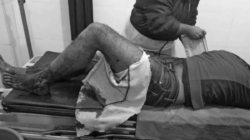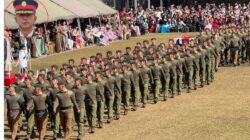facing problems as skilled workers move abroad.
Bhojpur, a hilly district in eastern Nepal, is well known for its khukuri-making business. The khukuris made here are famous not only in Nepal but also in other countries. However, recently, the industry has been facing problems due to a lack of skilled craftsmen and raw materials.
One major issue is the shortage of skilled craftsmen, as many young people who could learn the trade are moving abroad for work and education. Blacksmith Ghanshyam Bishwakarma says that due to youth migration and a lack of raw materials, the number of blacksmith industries producing khukuris is decreasing.
Khukuri-making takes place in various areas, including the district headquarters, Kot, Dalgau, Gogane, Khawa, Khairang, Taksar, Bokhim, Dawa, Timma, Dingla, Deurali, and Jarayotar. However, many of these industries are now at risk of shutting down due to the shortage of skilled workers and essential raw materials like wood and charcoal.
Bhojpuri khukuri has been famous since the Rana and Panchayat periods, but entrepreneurs complain that production has declined due to a shortage of manpower and raw materials.
Dinesh Gazmer, the owner of Ranjita Khukuri Industry, says that skilled craftsmen are hard to find, and there is also a lack of good-quality wood. As a result, production has decreased, making it difficult to meet demand. Due to the shortage of workers, they have to offer higher wages to keep the business running.
Hira Shrestha, the owner of Urmila Blacksmith Industry, says that Bhojpuri khukuris are used for practical purposes, decoration, and even as gifts during official ceremonies. Different types of khukuris, such as Sirupate, Baspate, Chitlange, Kothimuda, Panwala, Dharkhole, and Budune, are made in Bhojpur.
Khukuri production in Bhojpur is said to have started in 1965 (Bikram Sambat). In 1970 (B.S.), when King Mahendra visited the district, a local blacksmith named Singbahadur BK gifted him a khukuri. After this, the khukuri gained more recognition.
In the local market, a single khukuri costs between 800 and 1,800 Nepali rupees. In rural areas, Budune and Baspate khukuris are the most commonly used. Bhojpur khukuris are also exported to places like Dharan, Udayapur, Khandbari, and Kathmandu and even sent abroad as souvenirs and decorative items. Local entrepreneurs are demanding government support to preserve and promote this traditional industry.




